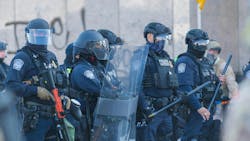Mich. Bill Would Ban Police from Wearing Masks, Require Visible ID
By Brendan Sanders
Source Midland Daily News, Mich.
What to know
- Michigan House Bill 4760 would mandate that police officers display visible ID (name or badge number and agency) during public interactions and bans masks or disguises, except in specific health or tactical scenarios.
- Exceptions include covert operations, disease prevention, toxic exposure and high-risk tactical incidents; all other violations are punishable by misdemeanor charges.
- The bill faces strong opposition from Republican leadership, with House Speaker Matt Hall calling it anti-law enforcement.
A new Michigan bill would require law enforcement officers to wear appropriate identification and prohibit them from wearing a mask or personal disguise.
Michigan House Bill 4760 would propose an amendment to the Michigan Penal Code (1931 PA 328) by adding Section 396a. It establishes clear rules regarding officer identification and the use of masks or disguises during public interactions.
It was introduced by Representative Betsy Coffia (D- District 103 in Traverse City) and sponsored by 20 other representatives.
"Those who protect and serve our community should not do so behind a concealed identity. When oversight is absent, trust erodes — and with it, accountability and transparency in public safety. In recent months, we've heard alarming reports of masked individuals arriving in unmarked cars, jumping out with rifles to detain people. To the average person, it looks like a violent kidnapping," Coffia said in a press release. "This practice — wearing masks and hiding identification — mirrors the tactics of secret police in authoritarian regimes and strays from the norms that define legitimate local law enforcement. It confuses and frightens communities. That's why I'm proud to join my colleagues in introducing this meaningful, common-sense legislation."
The bill requires that all law enforcement officers wear appropriate identification while interacting with members of the public as part of their official duties. This identification must clearly display either the officer's name or badge number, along with the full name or initials of the officer's employing law enforcement agency.
More on OFFICER.com
N.Y. Attorney General Urges Feds to Ban ICE Agents from Wearing Masks
- New York Attorney General Letitia James and 20 other state attorneys general sent a joint letter pushing for a federal measure prohibiting immigration agents from wearing masks and concealing their identities.
In addition to this, officers are prohibited from wearing masks or personal disguises during these interactions, ensuring that their identity is easily recognizable and transparent to the public.
"Masked policing has no place in a free society," Representative Veronica Paiz (D- Harper Woods), said. "Whether it's ICE or local law enforcement, the responsibility to protect, uphold the law and detain when necessary must come with visibility, accountability and public trust."
House Speaker Matt Hall (R- Richland) told MLive that the bill was going to be dead on arrival and would not pass the Michigan House of Representatives.
"The Michigan House will never pass this attack on law enforcement," Speaker Hall said. "The people want these dangerous criminal aliens off our street, and we are doing everything we can to partner with the Trump administration and put an end to illegal immigration. Democrats will do everything they can to get in the way of local police and ICE, because they've always cared more about criminals than victims. But that ends here — this ridiculous bill is dead on arrival."
Situations where masks would be permitted
Although the bill generally prohibits law enforcement officers from wearing masks during public interactions, it allows for exceptions under specific conditions. Officers may wear a mask designed to prevent the transmission of airborne diseases in situations where there is a risk of infection.
Similarly, they may wear masks to protect against airborne toxins that pose an immediate or long-term health risk. Furthermore, in high-risk tactical situations such as shootouts, standoffs, hostage situations, or terrorist incidents, officers are permitted to wear protective masks that offer physical protection to their faces. These allowances acknowledge the practical and safety needs of officers in certain dangerous or health-sensitive scenarios.
The bill explicitly exempts law enforcement officers from the identification requirement if they are involved in a covert operation. In such cases, concealing one's identity is essential to the effectiveness and safety of the operation, particularly when gathering evidence or investigating criminal activity in a discreet manner.
Penalties for non-compliance
To enforce the provisions of the bill, a penalty structure is established for officers who fail to comply. Any law enforcement officer who violates the identification or mask prohibition without qualifying for an exception is guilty of a misdemeanor. This offense is punishable by up to 90 days of imprisonment, a fine not exceeding $1,000, or both.
_____________
© 2025 the Midland Daily News (Midland, Mich.).
Visit www.ourmidland.com.
Distributed by Tribune Content Agency, LLC.
